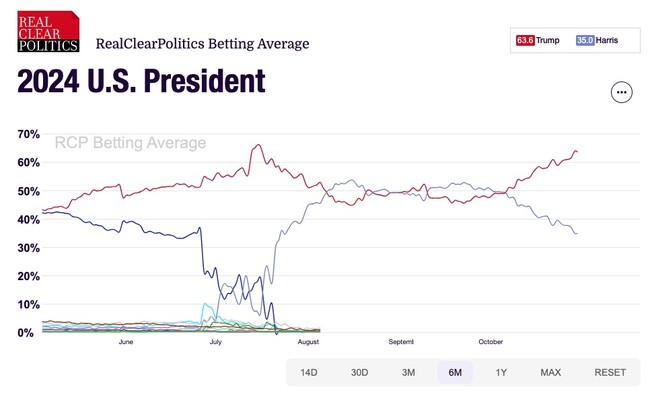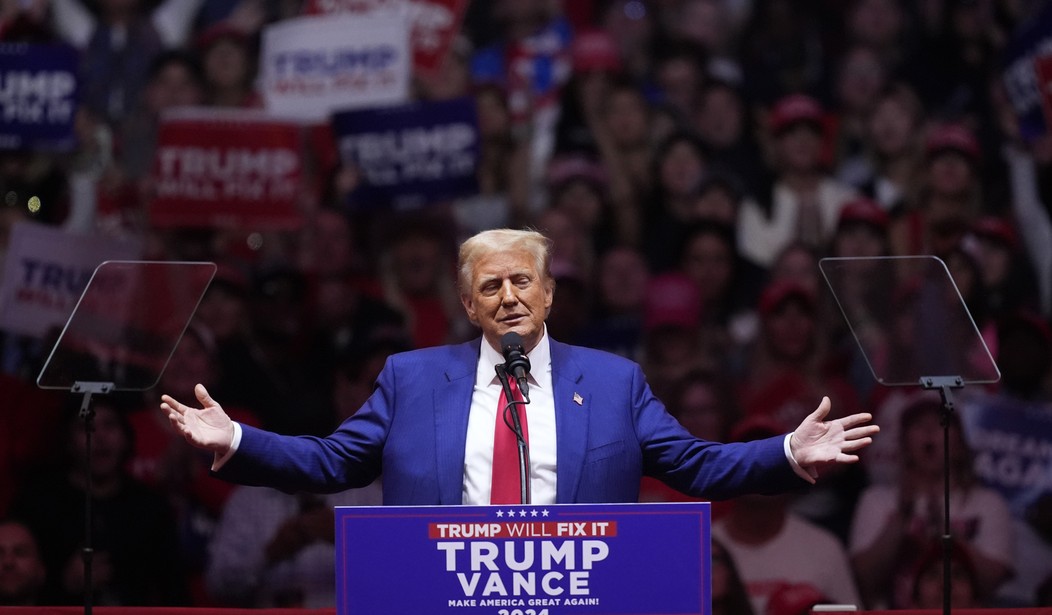Whenever friends and family -- those still speaking to me, of course -- ask me what I think about the election, I always answer, "Cautious optimism." The impulse to start measuring the drapes for a win always looms large, but data in politics is hard to read for conclusions in narrowly split electorates.
Looking at all of the polling, I'd rather be Donald Trump than Kamala Harris today, but either one could win this election based on a number of factors. The biggest known unknown at the moment would be GOTV, a large part of that equation that defies easy measure until after an election.
On the other hand, for the measures we do have, all signs seem to point in one direction. CNN's Harry Enten laid them all out today, including one potential indirect measure of GOTV:
If Trump wins, the signs were there all along.
— (((Harry Enten))) (@ForecasterEnten) October 30, 2024
No incumbent party has won another term with so few voters saying the country is on the right track (28%) or when the president's net approval rating is so low (Biden's at -15 pts).
Also, big GOP registration gains in key states. pic.twitter.com/knDQ2HOFtJ
What does this tell us? Elections usually come down to fundamentals in the electorate. Do people feel better off with the status quo, or the status quo ante? Do they see the country heading in the right direction or wrong direction? Does the incumbent party have significant approval and goodwill among voters? When all of those markers turn against the incumbent White House party, the voters almost always boot the incumbents in favor of a new approach.
The only caution to add here is that both parties are offering incumbencies, an unusual occurrence in American politics. Voters certainly view Donald Trump and his term more favorably than they did four years ago, but he's not a new and shiny candidate on which the GOP can project all things being possible. That's why Harris and her surrogates are trying to argue that the status quo belongs to Trump rather than Joe Biden and Kamala Harris. It doesn't appear that this argument has been effective, at least not yet, but that may be because that's all Harris has offered in this cycle: a referendum on Trump to oppose the referendum on the incumbent administration, as most presidential elections turn out to be.
That is why the big GOP registration gains are important. In the first place, there seems to be an assumption that the Trump campaign doesn't have a ground game, but the candidate campaigns generally don't handle that in recent cycles. (The fact that Trump is doing a lot more retail politicking in this cycle than in his other two elections gives a hint to increased attention to a ground game too.) The political parties handle GOTV, and so do super-PACs on both sides. The best pre-election measures of that effectiveness are early voting and voter registrations. The GOP is winning on the latter, as well as overall party-affiliation shifts, and they are doing much better on early voting in this cycle too.
What about the polling data? That still keeps trending in Trump's favor, although not decisively -- with one exception. The betting markets are now all fleeing to Trump, as RCP's aggregation shows:
 RCP tracks eight betting markets now, not just the most well-known Polymarket. All of them have wide gaps favoring Trump, and all of their odds look very close together. SMarkets and Betfair give Trump the lowest rating at 61%, while Bwin and Pointsbet have the highest at 66%. Those putting skin in the game certainly see the same signs that Enten does.
RCP tracks eight betting markets now, not just the most well-known Polymarket. All of them have wide gaps favoring Trump, and all of their odds look very close together. SMarkets and Betfair give Trump the lowest rating at 61%, while Bwin and Pointsbet have the highest at 66%. Those putting skin in the game certainly see the same signs that Enten does.
Does that mean Trump has it in the bag? No, and that's where the rest of the polls come into play. We may see a few new iterations over the next few days, but the numbers are really too close for comfort in the battleground states where this election is likely to be won. Harris now leads in the RCP aggregation for Michigan but only by 0.5 points, and that's only because of outliers from Susquehanna and Quinnipiac. Trump leads all of the other battleground states tracked by RCP, but only with significant leads in Georgia and Arizona. There are historical reasons to believe that the polls may miss a significant amount of Trump support, but again, that's something we know only after the election.
If this comes down to fundamentals and the current data, then Enten's correct -- we will have seen a Trump victory coming for a while. But we're not there yet, so ... don't get cocky.








Join the conversation as a VIP Member